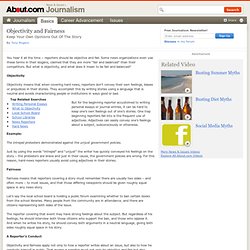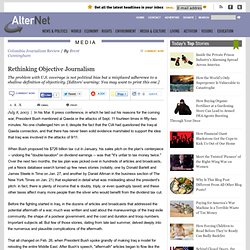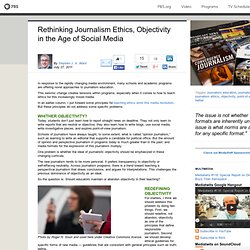

Objectivity, Professionalism, and Truth Seeking in Journalism : C.W. Anderson. Objectivity and modern journalism: What can we learn from OWS journalist firings? Principles of Journalism. The first three years of the Project’s work involved listening and talking with journalists and others around the country about what defines the work.

What emerged out of those conversations are the following nine core principles of journalism: 1. Journalism’s first obligation is to the truth Democracy depends on citizens having reliable, accurate facts put in a meaningful context. Journalism does not pursue truth in an absolute or philosophical sense, but it can–and must–pursue it in a practical sense. 2. While news organizations answer to many constituencies, including advertisers and shareholders, the journalists in those organizations must maintain allegiance to citizens and the larger public interest above any other if they are to provide the news without fear or favor. 3. Journalists rely on a professional discipline for verifying information. 4. Independence is an underlying requirement of journalism, a cornerstone of its reliability. 5. Objectivity and Fairness - Objectivity and fairness in news stories.
You hear it all the time – reporters should be objective and fair.

Some news organizations even use these terms in their slogans, claimed that they are more “fair and balanced” than their competitors. But what is objectivity, and what does it mean to be fair and balanced? Objectivity Objectivity means that when covering hard news, reporters don’t convey their own feelings, biases or prejudices in their stories. They accomplish this by writing stories using a language that is neutral and avoids characterizing people or institutions in ways good or bad. But for the beginning reporter accustomed to writing personal essays or journal entries, it can be hard to keep one’s own feelings out of one’s stories. Example: The intrepid protesters demonstrated against the unjust government policies.
Just by using the words “intrepid” and “unjust” the writer has quickly conveyed his feelings on the story – the protesters are brave and just in their cause, the government policies are wrong. Fairness. Rethinking Objective Journalism. July 8, 2003 | Like this article?

Join our email list: Stay up to date with the latest headlines via email. In his Mar. 6 press conference, in which he laid out his reasons for the coming war, President Bush mentioned al Qaeda or the attacks of Sept. 11 fourteen times in fifty-two minutes. No one challenged him on it, despite the fact that the CIA had questioned the Iraq-al Qaeda connection, and that there has never been solid evidence marshaled to support the idea that Iraq was involved in the attacks of 9/11. When Bush proposed his $726 billion tax cut in January, his sales pitch on the plan's centerpiece -- undoing the "double-taxation" on dividend earnings -- was that "It's unfair to tax money twice.
" Rethinking Journalism Ethics, Objectivity in the Age of Social Media. In response to the rapidly changing media environment, many schools and academic programs are offering novel approaches to journalism education.

This seismic change creates tensions within programs, especially when it comes to how to teach ethics for this increasingly mixed media. In an earlier column, I put forward some principles for teaching ethics amid this media revolution. But these principles do not address some specific problems. Whither objectivity? Today, students don’t just learn how to report straight news on deadline. Schools of journalism have always taught, to some extent, what is called “opinion journalism,” such as learning to write an editorial that supports a candidate for political office. One problem is whether the ideal of journalistic objectivity should be emphasized in these changing curricula. Public Journalism and the Problem of Objectivity. The objectivity norm in American journalism* Why did the occupational norm of ‘objectivity’ arise in American journalism?

This question has attracted the interest of many journalism historians but it has not previously been examined as an instance of a more general social phenomenon, the emergence of new cultural norms and ideals. Four conditions for the emergence of new norms are identified – two having to do with the self-conscious pursuit of internal group solidarity; and two having to do with the need to articulate the ideals of social practice in a group in order to exercise control over subordinates and to pass on group culture to the next generation. Home - Student.